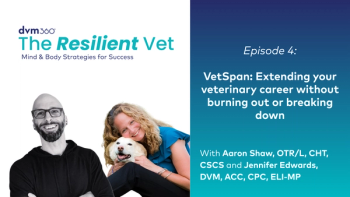
- dvm360 January 2022
- Volume 53
- Issue 1
“I” message vs “You” message
Carolyn Shadle, PhD, MS, discusses multiple ways that veterinary professionals can take care of their mental health both inside and outside their veterinary practice.
Veterinary professionals have a unique role in society because they take care of both pets and humans. They must advocate for the patient to get the care they need but also make sure the client is heard and understands what is happening. Because of these multifaceted responsibilities, veterinary professionals are especially at risk of sacrificing their mental health to care for those around them.
In a recent interview with dvm360®, Carolyn Shadle, PhD, MS, owner of Interpersonal Communication Services Inc, in the San Diego, California, region, discussed different ways veterinary professionals can improve their mental health.
Setting boundaries
Shadle said that veterinary professionals can prioritize their mental health by understanding their boundaries and finding their purpose. These recognitions are key steps to taking care of themselves.
“What is meaningful to them, what is OK for them, how far can they go, how long can they go, how long can they work, in what ways do they work, [and] what is their purpose? I think that setting boundaries is an important learning experience, and if you did not learn how to use [an] ‘I’ message as opposed to a ‘you’ message, it is time to learn that,” she explained.
According to Shadle, setting these boundaries to best align with what you want or need can also help you create the work boundaries you need. And because an “I” message communicates how you feel, it decreases the likelihood of the receiver becoming defensive and argumentative. A “you” message, on the other hand, tends to be more accusatory in tone and may result in a defensive response or argument.
Communication
Within the workplace, how can veterinary professionals help their mental health? Shadle explained that at work, veterinary professionals want to feel satisfied with what they are doing. This can come from hearing advice or praise from coworkers, managers, and owners. Another way to achieve this is by asking for and listening to feedback that is given to you.
“Satisfaction can come from knowing exactly how you are doing. If you feel like you should be doing better, ask about it: ‘Can I do better?’ or ‘What more can I learn?’ Asking for feedback is important,” Shadle said.
“But equally important is, if you are in a role of giving feedback, do you know how to give it and why you are giving it? You are not giving it to show someone that they are not doing well or to be blameful but, rather, ‘I am giving you feedback because I care about you, and I want to help you learn,’ ” she continued.
Along with asking for and giving feedback, it is important to learn from the feedback. Shadle also recommends asking for clarification if you are confused or want to know more to grow professionally.
Conclusion
Being a veterinary professional has its highs and lows. With angry clients, hard-to-tame pets, coworkers, and the fact that everyone is trying to adjust to life during the COVID-19 pandemic, it is no surprise that people are stressed and anxious. To help protect your mental health, Shadle recommended doing something you enjoy.
“I think everybody needs opportunities to get away from things,” she said. “[Exercising], taking a walk in the park, riding your bike, having a friend to talk to, going home [to] your pet, talking to your pet, [meditating]—it is going to be different for everyone, but everyone needs to have some way to get away.”
Articles in this issue
almost 4 years ago
Convert an existing building into a veterinary hospitalalmost 4 years ago
Diabetes management: Can we do a better job?almost 4 years ago
Key advances in veterinary oncologyalmost 4 years ago
The Dilemma: The referencealmost 4 years ago
Commentary: How do you define success?almost 4 years ago
Multicancer detection in dogs with cell-free DNAalmost 4 years ago
How One Health is forging a better futureabout 4 years ago
Work-life balance in veterinary medicine: Findings and solutionsNewsletter
From exam room tips to practice management insights, get trusted veterinary news delivered straight to your inbox—subscribe to dvm360.




